Moyu Zhang
Beijing University of Posts and Telecommunications
Infer As You Train: A Symmetric Paradigm of Masked Generative for Click-Through Rate Prediction
Nov 18, 2025Abstract:Generative models are increasingly being explored in click-through rate (CTR) prediction field to overcome the limitations of the conventional discriminative paradigm, which rely on a simple binary classification objective. However, existing generative models typically confine the generative paradigm to the training phase, primarily for representation learning. During online inference, they revert to a standard discriminative paradigm, failing to leverage their powerful generative capabilities to further improve prediction accuracy. This fundamental asymmetry between the training and inference phases prevents the generative paradigm from realizing its full potential. To address this limitation, we propose the Symmetric Masked Generative Paradigm for CTR prediction (SGCTR), a novel framework that establishes symmetry between the training and inference phases. Specifically, after acquiring generative capabilities by learning feature dependencies during training, SGCTR applies the generative capabilities during online inference to iteratively redefine the features of input samples, which mitigates the impact of noisy features and enhances prediction accuracy. Extensive experiments validate the superiority of SGCTR, demonstrating that applying the generative paradigm symmetrically across both training and inference significantly unlocks its power in CTR prediction.
Global-Distribution Aware Scenario-Specific Variational Representation Learning Framework
Aug 20, 2025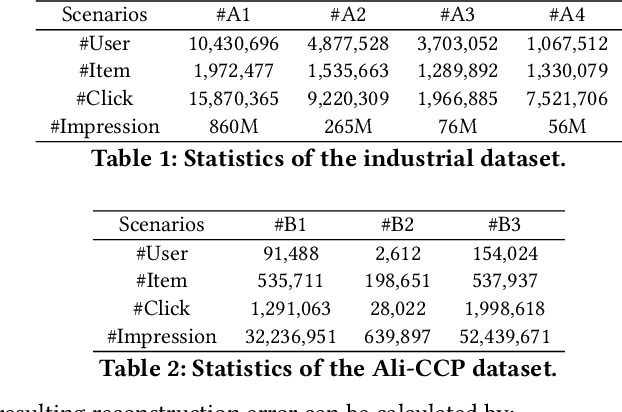
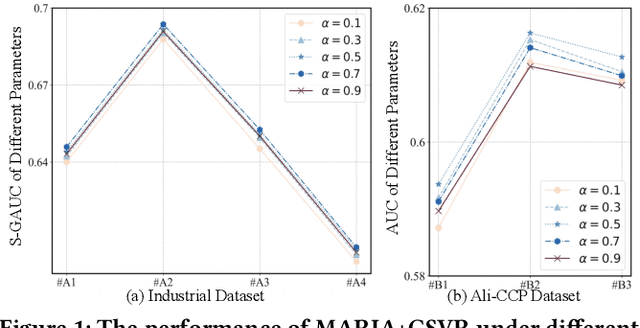
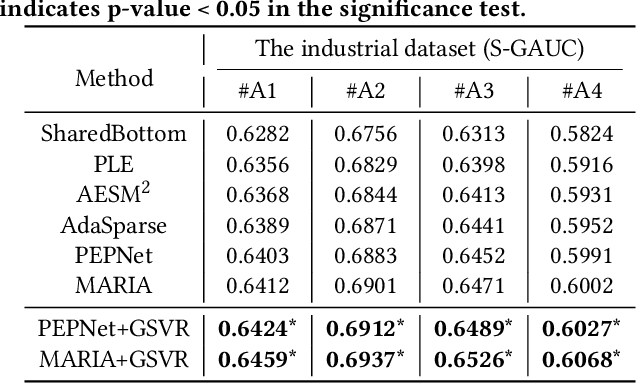
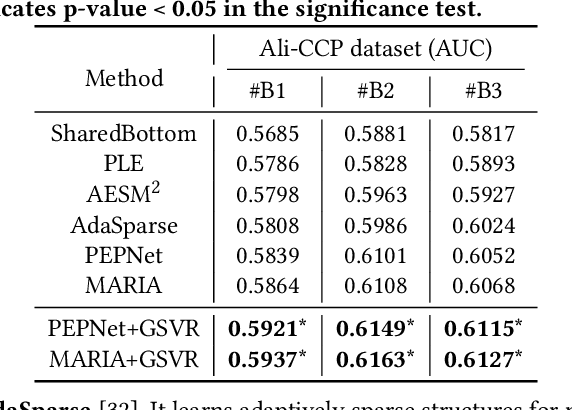
Abstract:With the emergence of e-commerce, the recommendations provided by commercial platforms must adapt to diverse scenarios to accommodate users' varying shopping preferences. Current methods typically use a unified framework to offer personalized recommendations for different scenarios. However, they often employ shared bottom representations, which partially hinders the model's capacity to capture scenario uniqueness. Ideally, users and items should exhibit specific characteristics in different scenarios, prompting the need to learn scenario-specific representations to differentiate scenarios. Yet, variations in user and item interactions across scenarios lead to data sparsity issues, impeding the acquisition of scenario-specific representations. To learn robust scenario-specific representations, we introduce a Global-Distribution Aware Scenario-Specific Variational Representation Learning Framework (GSVR) that can be directly applied to existing multi-scenario methods. Specifically, considering the uncertainty stemming from limited samples, our approach employs a probabilistic model to generate scenario-specific distributions for each user and item in each scenario, estimated through variational inference (VI). Additionally, we introduce the global knowledge-aware multinomial distributions as prior knowledge to regulate the learning of the posterior user and item distributions, ensuring similarities among distributions for users with akin interests and items with similar side information. This mitigates the risk of users or items with fewer records being overwhelmed in sparse scenarios. Extensive experimental results affirm the efficacy of GSVR in assisting existing multi-scenario recommendation methods in learning more robust representations.
Distribution-Guided Auto-Encoder for User Multimodal Interest Cross Fusion
Aug 20, 2025Abstract:Traditional recommendation methods rely on correlating the embedding vectors of item IDs to capture implicit collaborative filtering signals to model the user's interest in the target item. Consequently, traditional ID-based methods often encounter data sparsity problems stemming from the sparse nature of ID features. To alleviate the problem of item ID sparsity, recommendation models incorporate multimodal item information to enhance recommendation accuracy. However, existing multimodal recommendation methods typically employ early fusion approaches, which focus primarily on combining text and image features, while neglecting the contextual influence of user behavior sequences. This oversight prevents dynamic adaptation of multimodal interest representations based on behavioral patterns, consequently restricting the model's capacity to effectively capture user multimodal interests. Therefore, this paper proposes the Distribution-Guided Multimodal-Interest Auto-Encoder (DMAE), which achieves the cross fusion of user multimodal interest at the behavioral level.Ultimately, extensive experiments demonstrate the superiority of DMAE.
DGenCTR: Towards a Universal Generative Paradigm for Click-Through Rate Prediction via Discrete Diffusion
Aug 20, 2025

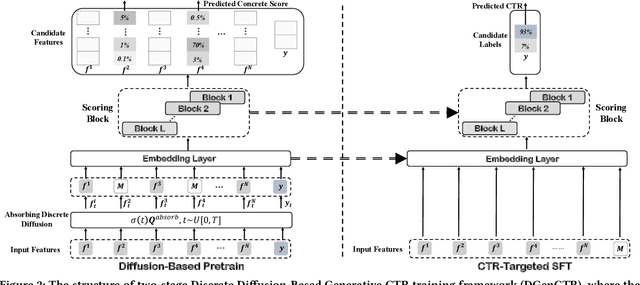
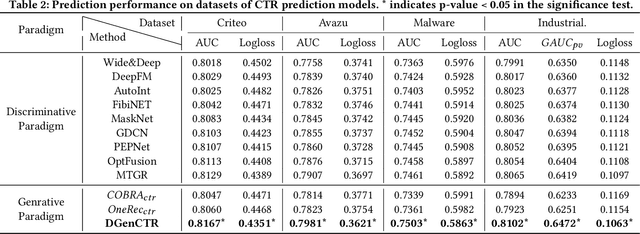
Abstract:Recent advances in generative models have inspired the field of recommender systems to explore generative approaches, but most existing research focuses on sequence generation, a paradigm ill-suited for click-through rate (CTR) prediction. CTR models critically depend on a large number of cross-features between the target item and the user to estimate the probability of clicking on the item, and discarding these cross-features will significantly impair model performance. Therefore, to harness the ability of generative models to understand data distributions and thereby alleviate the constraints of traditional discriminative models in label-scarce space, diverging from the item-generation paradigm of sequence generation methods, we propose a novel sample-level generation paradigm specifically designed for the CTR task: a two-stage Discrete Diffusion-Based Generative CTR training framework (DGenCTR). This two-stage framework comprises a diffusion-based generative pre-training stage and a CTR-targeted supervised fine-tuning stage for CTR. Finally, extensive offline experiments and online A/B testing conclusively validate the effectiveness of our framework.
CSMF: Cascaded Selective Mask Fine-Tuning for Multi-Objective Embedding-Based Retrieval
Apr 17, 2025

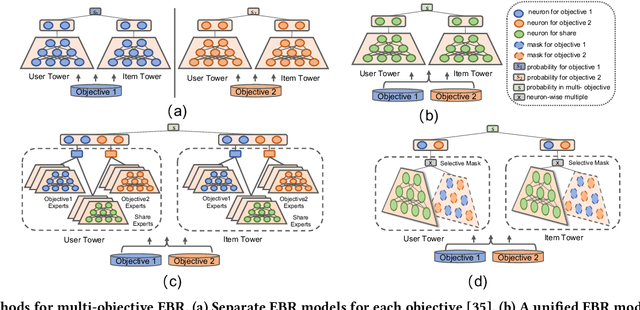

Abstract:Multi-objective embedding-based retrieval (EBR) has become increasingly critical due to the growing complexity of user behaviors and commercial objectives. While traditional approaches often suffer from data sparsity and limited information sharing between objectives, recent methods utilizing a shared network alongside dedicated sub-networks for each objective partially address these limitations. However, such methods significantly increase the model parameters, leading to an increased retrieval latency and a limited ability to model causal relationships between objectives. To address these challenges, we propose the Cascaded Selective Mask Fine-Tuning (CSMF), a novel method that enhances both retrieval efficiency and serving performance for multi-objective EBR. The CSMF framework selectively masks model parameters to free up independent learning space for each objective, leveraging the cascading relationships between objectives during the sequential fine-tuning. Without increasing network parameters or online retrieval overhead, CSMF computes a linearly weighted fusion score for multiple objective probabilities while supporting flexible adjustment of each objective's weight across various recommendation scenarios. Experimental results on real-world datasets demonstrate the superior performance of CSMF, and online experiments validate its significant practical value.
Scenario-Adaptive Fine-Grained Personalization Network: Tailoring User Behavior Representation to the Scenario Context
Apr 15, 2024Abstract:Existing methods often adjust representations adaptively only after aggregating user behavior sequences. This coarse-grained approach to re-weighting the entire user sequence hampers the model's ability to accurately model the user interest migration across different scenarios. To enhance the model's capacity to capture user interests from historical behavior sequences in each scenario, we develop a ranking framework named the Scenario-Adaptive Fine-Grained Personalization Network (SFPNet), which designs a kind of fine-grained method for multi-scenario personalized recommendations. Specifically, SFPNet comprises a series of blocks named as Scenario-Tailoring Block, stacked sequentially. Each block initially deploys a parameter personalization unit to integrate scenario information at a coarse-grained level by redefining fundamental features. Subsequently, we consolidate scenario-adaptively adjusted feature representations to serve as context information. By employing residual connection, we incorporate this context into the representation of each historical behavior, allowing for context-aware fine-grained customization of the behavior representations at the scenario-level, which in turn supports scenario-aware user interest modeling.
* Accepted by SIGIR 2024, 10 pages, 5 figures, 5 tables
Cognition-Mode Aware Variational Representation Learning Framework for Knowledge Tracing
Sep 03, 2023Abstract:The Knowledge Tracing (KT) task plays a crucial role in personalized learning, and its purpose is to predict student responses based on their historical practice behavior sequence. However, the KT task suffers from data sparsity, which makes it challenging to learn robust representations for students with few practice records and increases the risk of model overfitting. Therefore, in this paper, we propose a Cognition-Mode Aware Variational Representation Learning Framework (CMVF) that can be directly applied to existing KT methods. Our framework uses a probabilistic model to generate a distribution for each student, accounting for uncertainty in those with limited practice records, and estimate the student's distribution via variational inference (VI). In addition, we also introduce a cognition-mode aware multinomial distribution as prior knowledge that constrains the posterior student distributions learning, so as to ensure that students with similar cognition modes have similar distributions, avoiding overwhelming personalization for students with few practice records. At last, extensive experimental results confirm that CMVF can effectively aid existing KT methods in learning more robust student representations. Our code is available at https://github.com/zmy-9/CMVF.
* Accepted by ICDM 2023, 10 pages, 5 figures, 4 tables
Counterfactual Monotonic Knowledge Tracing for Assessing Students' Dynamic Mastery of Knowledge Concepts
Aug 07, 2023

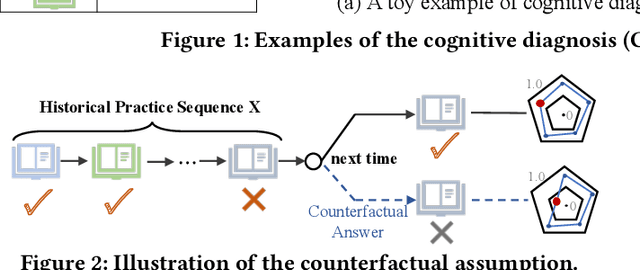
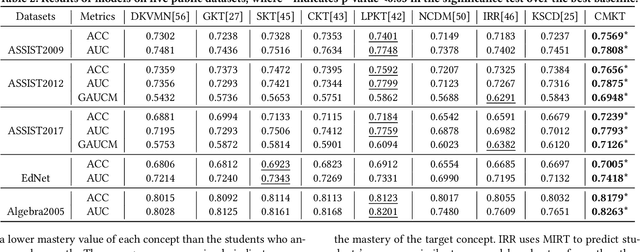
Abstract:As the core of the Knowledge Tracking (KT) task, assessing students' dynamic mastery of knowledge concepts is crucial for both offline teaching and online educational applications. Since students' mastery of knowledge concepts is often unlabeled, existing KT methods rely on the implicit paradigm of historical practice to mastery of knowledge concepts to students' responses to practices to address the challenge of unlabeled concept mastery. However, purely predicting student responses without imposing specific constraints on hidden concept mastery values does not guarantee the accuracy of these intermediate values as concept mastery values. To address this issue, we propose a principled approach called Counterfactual Monotonic Knowledge Tracing (CMKT), which builds on the implicit paradigm described above by using a counterfactual assumption to constrain the evolution of students' mastery of knowledge concepts.
No Length Left Behind: Enhancing Knowledge Tracing for Modeling Sequences of Excessive or Insufficient Lengths
Aug 07, 2023Abstract:Knowledge tracing (KT) aims to predict students' responses to practices based on their historical question-answering behaviors. However, most current KT methods focus on improving overall AUC, leaving ample room for optimization in modeling sequences of excessive or insufficient lengths. As sequences get longer, computational costs will increase exponentially. Therefore, KT methods usually truncate sequences to an acceptable length, which makes it difficult for models on online service systems to capture complete historical practice behaviors of students with too long sequences. Conversely, modeling students with short practice sequences using most KT methods may result in overfitting due to limited observation samples. To address the above limitations, we propose a model called Sequence-Flexible Knowledge Tracing (SFKT).
Multi-Factors Aware Dual-Attentional Knowledge Tracing
Aug 10, 2021Abstract:With the increasing demands of personalized learning, knowledge tracing has become important which traces students' knowledge states based on their historical practices. Factor analysis methods mainly use two kinds of factors which are separately related to students and questions to model students' knowledge states. These methods use the total number of attempts of students to model students' learning progress and hardly highlight the impact of the most recent relevant practices. Besides, current factor analysis methods ignore rich information contained in questions. In this paper, we propose Multi-Factors Aware Dual-Attentional model (MF-DAKT) which enriches question representations and utilizes multiple factors to model students' learning progress based on a dual-attentional mechanism. More specifically, we propose a novel student-related factor which records the most recent attempts on relevant concepts of students to highlight the impact of recent exercises. To enrich questions representations, we use a pre-training method to incorporate two kinds of question information including questions' relation and difficulty level. We also add a regularization term about questions' difficulty level to restrict pre-trained question representations to fine-tuning during the process of predicting students' performance. Moreover, we apply a dual-attentional mechanism to differentiate contributions of factors and factor interactions to final prediction in different practice records. At last, we conduct experiments on several real-world datasets and results show that MF-DAKT can outperform existing knowledge tracing methods. We also conduct several studies to validate the effects of each component of MF-DAKT.
* 10 pages, 10 figures, 6 tables
 Add to Chrome
Add to Chrome Add to Firefox
Add to Firefox Add to Edge
Add to Edge